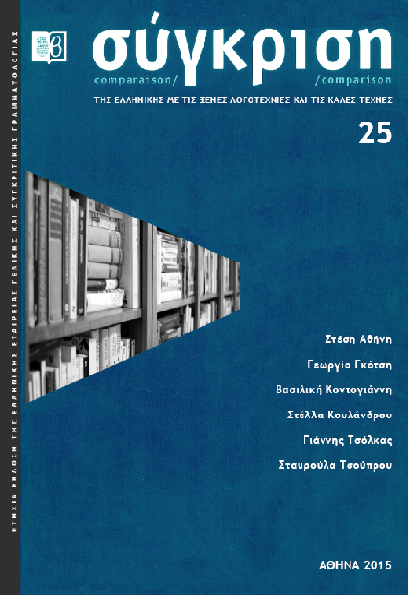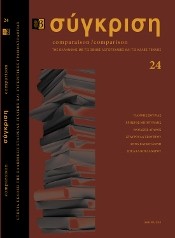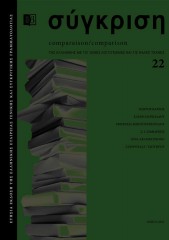Rilke, Παλαμάς, Σαχτούρης, Αθανασιάδης: ένα σημείο συνάντησης / Rilke, Sachtouris, Palamas, Athanasiades: a point of convergence
Περίληψη
With the date 28.1.1924, the translation of the first nine verses from the “Book of Pilgrimage” is entered in the Appendix of Xanatonismene Mousike [Retoned Music], that is the collection of translations by Kostis Palamas, as these were included in his Complete Works. The “Book of Pilgrimage” is the second of the three parts of Rainer Maria Rilke’s Stundenbuch (which was translated into Greek as “Horologion” by Aris Diktaios, but is more widely known as “Book of Hours” and is referred to as such in Palamas’s translation. This translation of the characteristic excerpt from the poetic oeuvre of the “romantic” Rilke, as Palamas considered him, was destined – and not without reason – to be the most popular, even though several translations have followed. Except that, as we shall see, the perception of the specific verses as referring to the love affair between a man and a woman, a perception-interpretation that has prevailed widely, does not correspond (exactly) to the “reality” of Rilke’s poem. The two intertexts, to which we shall refer in the present article, seem to presuppose a corresponding interpretation, at least broadly speaking. So, examined here is the intertextual contact of the aforesaid poetic passage-translation from Rilke’s Stundenbuch, on the one hand, with the poem “The night of the forgotten woman” from the collection the Forgotten Woman (1945) by Miltos Sachtouris (who spoke often with love and respect about the influence of Rilke’s work on his own), and on the other, with a prose passage from the novel The Throne Room, by Tasos Athanasiadis (whose rich textual-intellectual contact with Rilke’s oeuvre has also been pointed out), which has characteristically been defined as a “modern Aesop’s fable”.
Λεπτομέρειες άρθρου
- Πώς να δημιουργήσετε Αναφορές
-
Τσούπρου Σ. (2016). Rilke, Παλαμάς, Σαχτούρης, Αθανασιάδης: ένα σημείο συνάντησης / Rilke, Sachtouris, Palamas, Athanasiades: a point of convergence. Σύγκριση/Comparaison/Comparison, 25, 99–114. https://doi.org/10.12681/comparison.95
- Τεύχος
- Τόμ. 25 (2015)
- Ενότητα
- Άρθρα

Αυτή η εργασία είναι αδειοδοτημένη υπό το CC Αναφορά Δημιουργού – Μη Εμπορική Χρήση – Παρόμοια Διανομή 4.0.
Οι συγγραφείς των άρθρων που δημοσιεύονται στο περιοδικό Σύγκριση διατηρούν τα δικαιώματα πνευματικής ιδιοκτησίας επί των άρθρων τους, δίνοντας στο περιοδικό το δικαίωμα της πρώτης δημοσίευσης. Άρθρα που δημοσιεύονται στο περιοδικό Σύγκριση διατίθενται με άδεια Creative Commons 4.0 και σύμφωνα με την άδεια μπορούν να χρησιμοποιούνται ελεύθερα, με αναφορά στο/στη συγγραφέα και στην πρώτη δημοσίευση για μη κερδοσκοπικούς σκοπούς και με δικαίωμα τροποποίησης μόνον με παρόμοια διανομή (αν αναμείξετε, τροποποιήσετε, ή δημιουργήσετε πάνω στο υλικό, πρέπει να διανείμετε τις δικές σας συνεισφορές υπό την ίδια άδεια όπως και το πρωτότυπο).





